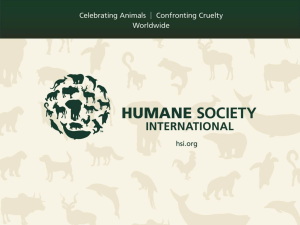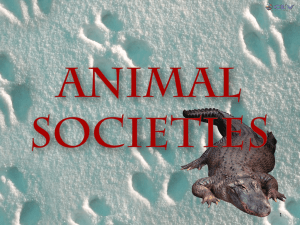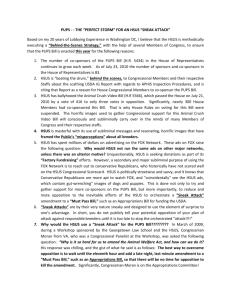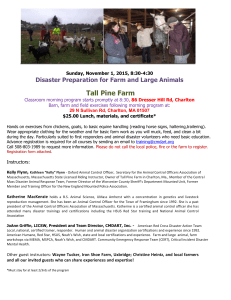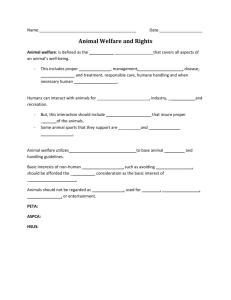Martosko
advertisement
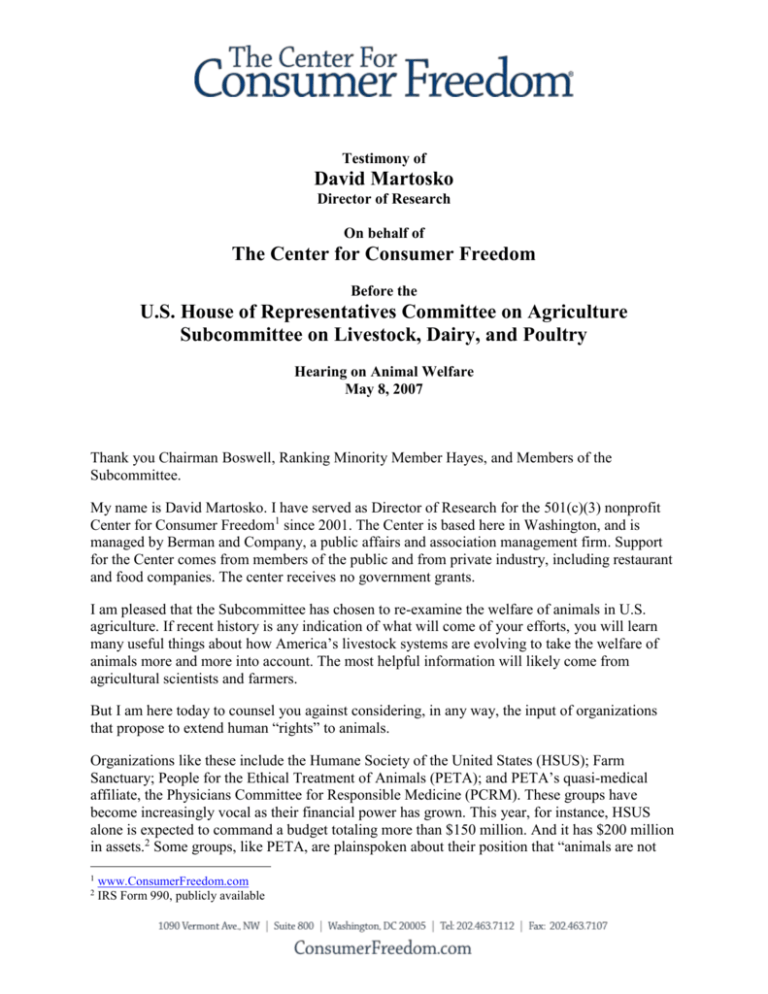
Testimony of David Martosko Director of Research On behalf of The Center for Consumer Freedom Before the U.S. House of Representatives Committee on Agriculture Subcommittee on Livestock, Dairy, and Poultry Hearing on Animal Welfare May 8, 2007 Thank you Chairman Boswell, Ranking Minority Member Hayes, and Members of the Subcommittee. My name is David Martosko. I have served as Director of Research for the 501(c)(3) nonprofit Center for Consumer Freedom1 since 2001. The Center is based here in Washington, and is managed by Berman and Company, a public affairs and association management firm. Support for the Center comes from members of the public and from private industry, including restaurant and food companies. The center receives no government grants. I am pleased that the Subcommittee has chosen to re-examine the welfare of animals in U.S. agriculture. If recent history is any indication of what will come of your efforts, you will learn many useful things about how America’s livestock systems are evolving to take the welfare of animals more and more into account. The most helpful information will likely come from agricultural scientists and farmers. But I am here today to counsel you against considering, in any way, the input of organizations that propose to extend human “rights” to animals. Organizations like these include the Humane Society of the United States (HSUS); Farm Sanctuary; People for the Ethical Treatment of Animals (PETA); and PETA’s quasi-medical affiliate, the Physicians Committee for Responsible Medicine (PCRM). These groups have become increasingly vocal as their financial power has grown. This year, for instance, HSUS alone is expected to command a budget totaling more than $150 million. And it has $200 million in assets.2 Some groups, like PETA, are plainspoken about their position that “animals are not 1 2 www.ConsumerFreedom.com IRS Form 990, publicly available ours to eat.”3 PCRM is more deceptive about its endgame, using its four-percent physician membership4 to pose as a mainstream medical charity that promotes vegetarianism for health reasons. Farm Sanctuary’s leaders have proven that they are not above breaking the law to get what they want, incurring massive election-fraud fines in one Florida battle that actually extended constitutional protections to pigs.5 Regardless of their respective appetite for honest and lawful debate, animal rights groups like HSUS, Farm Sanctuary, PETA, and PCRM are led by dietary “vegans”6 who abhor the very idea of raising animals for food. PETA, PCRM, and HSUS, for instance, employ “no animal products in the workplace” employee policies. (We’re unaware if Farm Sanctuary has such a policy, but it would be consistent with the group’s stated positions.) Not only are meat and dairy products forbidden in these organizations, but staffers are not to wear animal-derived clothing including leather shoes, silk ties, or wool suits. It is the position of the Center for Consumer Freedom that when the topic of discussion is how to improve animal agriculture, the views of animal rights groups like these should not be taken seriously alongside those of true stakeholders who actually participate in the system. HSUS, Farm Sanctuary, PETA, and PCRM are not interested in improving animal agriculture. They seek to dismantle and destroy it. Their true agenda is to put all the real stakeholders out of business. To be fair, some groups (PETA foremost among them) have been candid about their goal of eliminating animal protein from the diets of all human beings. One PETA Vice President has said that “eating meat … is not your personal decision, any more than whether somebody beats their child is their personal decision.”7 For context, this same PETA leader has also publicly advocated “blowing stuff up and smashing windows” as “a great way to bring about animal liberation.”8 But the self-invented moral high ground of HSUS is far more subtle in its orientation. HSUS takes full advantage of the public misperception that it speaks for a silent animal constituency of This statement can reliably be found on most of PETA’s more than 100 websites. PCRM’s newest website says the group has “over 6000 member physicians” (www.nutritionmd.org/about_us.html, accessed on May 1, 2007). And a recent PCRM fundraising letter states that the group has "nearly 200,000 members." 5 Farm Sanctuary paid a $50,000 fine after the Florida Elections Commission found it guilty of 210 counts of campaign finance fraud, stemming from the group’s promise of tax-deductibility for contributions intended to sway an election. The commission chose to address only the finance fraud committed against Floridians, declining to address the thousands of similar offenses involving donors from other states. The convictions were handed down weeks after the election, long after Farm Sanctuary’s unlawful behavior helped to add pigs to the state constitution. 6 In common usage, a “vegan” is a strict vegetarian who uses and consumes no animal products (including fish, beef, chicken, pork, eggs, dairy foods, and honey). 7 PETA Vice-President Bruce Friedrich, at the “Animal Rights 2002” national conference (June 29, 2002) 8 Bruce Friedrich, at the “Animal Rights 2001” national conference (July 2, 2001). In its full context, Friedrich said: “If we really believe that these animals do have the same right to be free from pain and suffering at our hands, then, of course we’re going to be, as a movement, blowing stuff up and smashing windows. For the record, I don’t do this stuff, but I do advocate it. I think it’s a great way to bring about animal liberation … I think it would be a great thing if all of these fast-food outlets, and these slaughterhouses, and these laboratories, and the banks that fund them exploded tomorrow. I think it’s perfectly appropriate for people to take bricks and toss them through the windows, and everything else along the line. Hallelujah to the people who are willing to do it.” 3 4 dogs and cats. Our research indicates that most Americans mistakenly believe HSUS exists primarily to shelter homeless dogs and cats. In reality, HSUS doesn’t operate a single pet shelter anywhere. And despite its name, the “Humane Society of the United States” is not actually affiliated with any local “humane society” anywhere in the United States.9 Few Americans know this, and HSUS used the resulting (and unearned) public good will to raise a reported $34 million after Hurricane Katrina from Americans who wanted to help reunite lost pets with their owners.10 Louisiana Attorney General Charles Foti is investigating the disposition of all this money,11 comparatively little of which seems to have been spent on Katrina-related pet rescue.12 The Center for Consumer Freedom will continue to expose the manipulations of fact and public deceptions that appear in so many animal-rights campaigns. But groups like HSUS, PETA, PCRM, and Farm Sanctuary are zealous and persistent—some would say fanatical. They will continue to use their undeserved public reputations to chip away at all of animal agriculture, one skirmish at a time. Lately, their chosen targets have included pork, veal, egg, and duck farmers. Before long it will be feedlots and dairy producers. There is not a single segment of animal agriculture that proponents of animal “rights” haven’t attacked unfairly. And this isn’t surprising. Animal activists’ unwavering promotion of a strict vegetarian or “vegan” diet tends to make enemies of livestock producers who aren’t eager to abandon their heritage and history just because an activist says so. If I told you ten years ago that the animal rights movement had its sights set on not just hampering, but outlawing, a specific kind of animal protein enjoyed by many people, you might not have believed me. But look what has happened in the case of foie gras. HSUS and Farm Sanctuary have decided not to push for reform, but for abolition. This is an indication of things to come. I confess that I’ve never eaten foie gras. Having grown up on the wrong side of the tracks in a rust-belt city, I suspect my palate wouldn’t appreciate it. But who are these people to decide I should never have the chance to try it? When zealots ban books because of their politics, millions of people rise up. It’s a mystery to me why banning a food for political reasons isn’t viewed the same way. Ten years from now, will we be talking about veal speakeasies? And considering the small scale of veal agriculture, truly a family-farming business, wouldn’t that be ironic? Veal is a perfect example of a livestock trade that animal activists ought to be supporting. These animals get From a disclaimer buried within HSUS’s website (and conspicuously absent from the group’s ubiquitous fundraising mailers): “The HSUS is neither legally nor contractually affiliated with—nor is a parent organization for—local humane societies, animal shelters, or animal care and control agencies. In short, The HSUS does not operate or have direct control over any animal shelter.” (www.hsus.org/pets/issues_affecting_our_pets/animal_abuse_and_neglect/reporting_animal_abuse_or_neglect.html, accessed on May 1, 2007) 10 “Robust economy = robust giving,” The Christian Science Monitor. June 20, 2006 11 “Red Cross, Humane Society Under Investigation,” The Washington Post. March 26, 2006 12 "Only a small percentage of the money was specifically earmarked for the Katrina response.” From a statement attributed to HSUS in “Humane Society spending probed,” The Times-Picayune. March 18, 2006 9 individualized care. Veal farmers spend a significant amount of money on quality-assurance programs involving audits by veterinarians. And—let’s face it—veal farmers provide a purpose for male dairy calves that would otherwise be destroyed. HSUS and Farm Sanctuary ought to be promoting veal. But bashing it has always been good for their fundraising, so they never will. Last week HSUS released a self-serving scorecard, ranking 25 metropolitan U.S. regions according to what it called its “Humane Index.”13 One subset of this index, titled “Humane Eats,” employs the “number of vegetarian restaurants per capita” as its sole criterion.14 By its own admission (although delivered in a less strident fashion than PETA might embrace), HSUS judges that only meatless eating should be considered “humane.” Similarly, in 2005 HSUS released its “Guide to Vegetarian Eating.”15 An HSUS press statement later that year encouraged consumers to “try delicious meat alternatives.”16 In an interview with the vegetarian-advocacy magazine Satya, one HSUS campaign manager included “promoting vegetarian eating” among HSUS’s goals.17 In the same issue of that magazine, HSUS’s president said his organization was “now doing a guide to vegetarian eating, to really make the case for it.”18 Given HSUS’s disingenuous but skillful habit of positioning itself as a mainstream animal welfare organization, its advocacy of strict vegetarianism may come as a bit of a surprise. But let me be clear: HSUS and comparatively more flamboyant groups like PETA share the same exact long-term goals. The chief difference is in the tactics they employ to move the “vegan” diet from the margins of society into its mainstream. In this respect, the super-rich HSUS is basically PETA with a nicer wristwatch. And far fewer naked interns. Lest the Center for Consumer Freedom be described as an anti-vegetarian organization, I should state unequivocally that we are interested in preserving the viability of all dietary choices, including those of the tiny segment of Americans who choose the strictest vegetarian lifestyle. It’s a free country. Consumers should be free to make their own choices. But when groups with gargantuan budgets mislead the public about food that they don’t believe the rest of us should be allowed to choose, as HSUS has done, we object. Here is just one example of many. HSUS's “Guide to Vegetarian Eating” misstated the nutritional content of chicken in order to discourage people from eating it. “Even when the chicken’s skin is removed, the dark meat is thrown away, and a nonfat cooking method is used,” HSUS wrote in 2005, “chicken is still 23 percent fat.”19 Not so. A 140-gram “The HSUS Unveils America’s Most Humane City: San Francisco Leads Nation, Followed by Seattle and Portland,” press release. The Humane Society of the United States. April 30, 2007 14 www.humaneindex.org, accessed on May 1, 2007 15 See www.hsus.org/farm/resources/pubs/gve 16 “Celebrate World Vegetarian Day on October 1,” press release. The Humane Society of the United States. September 28, 2005 17 “Standing Up For Farmed Animals: The Satya Interview with Paul Shapiro,” Satya. June/July 2005 18 “(R)Evolution From Within? New Directions for the Humane Society: The Satya Interview with Wayne Pacelle,” Satya. June/July 2005 19 www.hsus.org/web-files/PDF/farm/gve.pdf, page 9, accessed on August 11, 2005 13 serving of roasted, skinless white-meat chicken has only five grams of fat.20 That's less than four percent. As it turns out, the PETA-affiliated Physicians Committee for Responsible Medicine has been using nearly the same language since at least 2000, claiming that “[e]ven when the skin is removed, dark meat is thrown away, and a non-fat cooking method is used, chicken is still 23 percent fat.”21 In 2001, I challenged PCRM president Neal Barnard on this point during one of his Maryland book-signing appearances. Barnard conceded that he was wrong, but PCRM has never corrected its error. HSUS republished it uncritically (or perhaps intentionally) and only corrected the record in its “Guide to Vegetarian Eating” this year.22 Other HSUS web pages, however, still contain the original agenda-driven falsehood.23 At the Center for Consumer Freedom, we have become accustomed to this sort of misinformation coming from animal rights groups. And we can almost understand it. If you believe—as leaders of HSUS, PETA, Farm Sanctuary, and PCRM have all historically believed—that a veal calf or a breeding sow (or even a lab rat) is morally equivalent to my daughter or your mother, it becomes remarkably easy to invent moral justifications for cutting factual corners, breaking election finance law, or even advocating the murder of people who don’t share your views.24 But back to my main point: Groups like this are not interested—and never will be interested—in improving animal agriculture. Improvements to the existing system will likely make it more efficient and more profitable. Even progressive animal-welfare reforms, such as those being embraced by small-scale family farmers in the veal industry, generally serve to make the American public increasingly comfortable with the idea of buying meat and dairy foods. This is anathema to the animal rights movement. Among HSUS’s more cynical attempts to erode the institution of animal agriculture came in 2002, when it began to apply “The Three R’s” to meat production.25 The Three R’s represent a guiding principle in modern biomedical research—Reducing the number of animals used to a 20 www.calorie-count.com/calories/item/5064.html, accessed on May 1, 2007 “There's No Room for Chicken in a Healthy Diet,” Good Medicine. Spring/Summer 2000. Accessed at www.pcrm.org/magazine/GM00SpringSummer/GM00SpSum2.html on May 1, 2007 22 www.hsus.org/web-files/PDF/farm/gve.pdf, page 9, accessed on May 1, 2007. Google’s recent cache of the text from this PDF (http://209.85.165.104/search?q=cache:B-2Q7huJNo4J:www.hsus.org/web-files/PDF/farm/gve.pdf, accessed on May 1, 2007) still shows the original copy. 23 “Isn’t Chicken Good For You?” at www.hsus.org/farm/resources/pubs/gve/for_your_health.html, accessed on May 1, 2007 24 In one widely reported case, Dr. Jerry Vlasak openly advocated the murder of his fellow doctors whose research requires the use of animals. He was speaking as a spokesperson for the Physicians Committee for Responsible Medicine at the “Animal Rights 2003” national conference. “I dont think youd have to kill -- assassinate -- too many,” Vlasak told the assembled activists. “I think for 5 lives, 10 lives, 15 human lives, we could save a million, 2 million, 10 million non-human lives.” 25 HSUS website, accessed by the Coalition to Support Iowa’s Farmers on May 17, 2002. Archived at www.supportiowasfarmers.org/activistnews/humane.aspx. Later repeated at www.hsus.org/farm/resources/pubs/rrr.html, accessed on May 1, 2007 21 minimum, Refining the way experiments are carried out so that animals suffer as little as possible, and Replacing animal experiments with non-animal models wherever possible.26 Biomedical research scientists generally agree with animal welfare advocates that it would be lovely to live in a world where animals weren’t needed for research. Activists, however, generally refuse to acknowledge that we don’t presently live in that world. The survival of millions of people, quite literally, may depend on research that requires the use of animals. But considering the cost and regulatory burden of using lab rats and other animals, most scientists would rather it weren’t necessary. So they generally agree to Reduce the number of animals they use, Refine their techniques, and Replace as many animal experiments as possible with other research methods. Only a militant vegetarian could apply this formulation to meat and dairy production. Livestock farmers don’t want to “reduce” their herds or “replace” animal protein in our food supply with tofu. The vast majority of Americans, being omnivores, don’t want this either—although they generally embrace “refinements” that appear sensible. Yet HSUS persists in nudging us all toward a PETA-approved diet that includes no meat or dairy foods at all. HSUS is less interested in the welfare of animals than in convincing Americans that the phrase “humanely raised meat” is an oxymoron. In his youth, one HSUS manager famously declared on a public mailing list: “My goal is the abolition of all animal agriculture.”27 And HSUS’s current president Wayne Pacelle has, to my knowledge, never disavowed his published opposition to the breeding of livestock. “We have no ethical obligation to preserve the different breeds of livestock produced through selective breeding,” he said a decade ago. “One generation and out.”28 As long as people who have enthusiastically articulated this anti-meat worldview continue to lead HSUS, it will be impossible to convince American farmers and ranchers that HSUS doesn’t intend to do them harm. Personally, I will believe that HSUS and Farm Sanctuary are in favor of “humane” meat production on the day that their leaders join me in eating it. I invite Gene Baur, Wayne Pacelle, and Paul Shapiro, for instance, to e-mail me and let me know what they think the most humanely raised veal on the planet is. Dinner is on me. All they have to do is eat it—in front of a few dozen cameras. I’m confident that I won’t have to buy that meal, because those gentlemen don’t believe such a thing as “humane” meat production can ever exist. Put another way, imagine that Congress required U.S. farmers to supply every pig, chicken, duck, and cow in all the land with private rooms, daily rubdowns, video iPods, and organic meals catered by Wolfgang Puck himself. What would happen? Would PETA cheerfully pack up its Hollywood rolodex? Would this satisfy Farm Sanctuary or HSUS? No. They would continue to A good all-purpose practical guide to the Three R’s can be found on the website of the University of Kansas, at www.ur.ku.edu/~acu/chapter2.html#rrr 27 HSUS manager John “J.P.” Goodwin, in a message to the “AR-Views” electronic listserv 28 In Animal People News. May 1, 1993. 26 argue that farm animals have inherent “rights”—and chief among them is the right to not be eaten. Besides, declaring your own obsolescence has a way of drying up donations. I must reiterate that in the context of considering how best to raise animals for food, radical vegans in the animal-rights community are strictly outsiders. They don’t deserve a place at the debating table, because their fondest wish is to destroy the table itself. Consider the uproar that would ensue if Rush Limbaugh were invited to overhaul the Democratic Leadership Council. Or if Cindy Sheehan were asked to moderate a Republican primary debate. These polarizing figures probably have interesting ideas about how their opponents could do things differently, but thinking people would instantly recognize their ulterior motives. The last person whose input you should invite is someone who has sworn to put you out of business. This is what we have with organizations like HSUS and Farm Sanctuary. They have parlayed an illegitimate moral superiority into the power to antagonize, lecture, and strong-arm America’s farmers—and the countless people who enjoy eating what they bring to market. Seriously considering the input of radicals like these makes no sense. Thank you very much, Mr. Chairman, for holding this hearing and for inviting my testimony today. I will be happy to answer your questions and those of your colleagues. David Martosko is Director of Research at the Center for Consumer Freedom (CCF), a Washington, DC nonprofit organization dedicated to defending consumers’ food choices. David is CCF's principal research expert on the politics of animal rights. He holds a B.A. from Dartmouth College and a Masters Degree from the Johns Hopkins University. His family includes two practicing veterinarians. Mr. Martosko frequently shares CCF’s expertise with federal law enforcement officers, government officials, and media commentators. In 2005 he testified about the threat of animal-rights violence and eco-terrorism before the United States Senate Committee on Environment and Public Works. Last year he was invited to lecture the United Kingdom's National Extremism Tactical Coordination Unit (NETCU) about the growing threat of lawless animal-rights radicalism on both sides of the Atlantic. Dozens of newspapers have published Mr. Martosko’s opinion pieces, and he has appeared on hundreds of domestic and international television and radio broadcasts. He is also a frequent source of information for reporters writing about food politics, animal agriculture, and environmental and animal-rights advocacy groups. Mr. Martosko lives in Virginia with his wife and daughter, and expects to complete a book about the American animal rights movement during the coming year.
